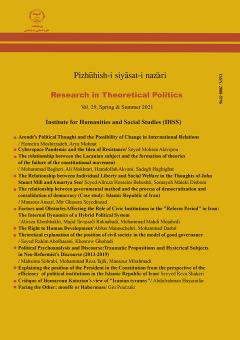Factors and Obstacles Affecting the Role of Civic Institutions in the "Reform Period" in Iran: The Internal Dynamics of a Hybrid Political System
Subject Areas : Research in Theoritical PoliticsAlireza Khoshbakht 1 , Majid tavasoli 2 * , Mohammadmahdi mojahedi 3
1 - Ph.D. Candidate in Political Science, Islamic Azad University, Science and Research Branch, Tehran, Iran.
2 - Assistant Professor, Department of Political Science, Islamic Azad University, Science and Research Branch, Tehran, Iran. tavasoli@gmail.com
3 - Assistant Professor, Department of Political Science, Islamic Azad University, Science and Research Branch, Tehran, Iran
Keywords: Transition to Democracy, Hybrid Regimes, Rentier Government, Islamic Republic and Reform Period in Iran,
Abstract :
The purpose of this article is to discuss the political ups and downs of the “Reform era” in Iran (1997-2005). To analyze the “Islamic Republic of Iran” as a political regime and its dynamics, “Hybrid Regimes” theories have been used in current work. Such theories reject the duality of Democracy-Authoritarianism and try to provide essential concepts for analyzing the regimes which are in the middle of the spectrum. Those regimes have unique features in comparison to Democratic or Authoritarian regimes. To analyze the Islamic Republic of Iran as a political regime and to explain the ups and downs of the “Reform era” in Iran, the studies of four researchers on “hybrid Regimes” have been used here. Some of the keynotes which have been applied to the current study to discuss the political ups and downs of that specific period are as follows: the importance of political competition, social and political backgrounds of creation of the Islamic Republic of Iran as a hybrid regime, and finally, the relation between such a regime and rentier economy in Iran. Finally, the article has concluded that the reformist’s earlier progress and their later withdraw and defeat could be considered as “inner dynamics of a hybrid regime” instead of the “the defeated transition to democracy”.
احمدی، بابک (1384) کار روشنفکری، تهران، مرکز.
ارزشها و نگرشهای ایرانیان (1382) موج دوم، ویرایش اول.
اوتاوی، مارینا (1386) گذار به دموکراسی یا شبه اقتداگرایی، ترجمه سعید میرترابی، تهران، قومس.
برزین، سعید (1377) جناح¬بندی سیاسی در ایران از دهه 1360 تا دوم خرداد 1376، تهران، مرکز.
بشیریه، حسین (1380) موانع توسعه سیاسی در ایران، تهران، گام نو.
اسکاچپول، تدا (1382) دولت رانتیر و اسلام شیعی در ایران، ترجمه محمدتقی دلفروز، مجله مطالعات راهبردی، تهران، شماره 19.
تیلی، چارلز (1392) دموکراسی؛ جامعه¬شناسی تاریخی تحولات دموکراتیک، ترجمه یعقوب احمدی، تهران، جامعهشناسان.
جلاییپور، حمیدرضا (1379) دولت پنهان: بررسی جامعه¬شناختی عوامل تهدیدکننده جنبش اصلاحات 1378-1379، تهران، طرح نو.
خبرگزاری ایرنا (1394) گزارش یک نشست: مطبوعات دوره اصلاحات در بوته نقد، گزارش ایرنا از میزگرد مطبوعات دهه 70 در دانشگاه تهران با حضور عیسی سحرخیز، حمیدرضا جلاییپور و کامبیزنوزری، 6 خرداد: https: //www.
irna.
ir/news/81624453/.
خوشبخت، علیرضا (1396) «نظریه رژیمهای دوزیستی، گذر از «گذار به دموکراسی»»، فصلنامه مطالعات ایرانی پویه، زمستان1396، شماره 2، صص169-185.
دیهیمی، خشایار (1381) این ابرها خواهند بارید، مجموعه یادداشتهای سیاسی، تهران، طرح نو.
روزنامه کیهان، 22/10/1358 روزنامه اطلاعات، 30/10/1358 سلیمی، حسین (1384) کالبدشکافی ذهنیت اصلاحگرایان، تهران، گام نو.
شادلو، عباس (1386) تکثرگرایی در جریان اسلامی، تهران، وزرا.
فضلی¬نژاد، سیف¬الله ومرتضی احمدیان (1389) «اقتصاد رانتی در ایران و راههای برون¬رفت از آن»، مجله اقتصادی- ماهنامه بررسی مسائل و سیاست¬های اقتصادی، بهمن و اسفند، شماره 11 و 12، صص 129-158.
فلاحی، احسان و محمدعلی بصیری (1396) بررسی ریشههای داخلی نواقتدارگرایی در آسیای مرکزی در چارچوب الگوی نوپاتریمونیالیستی، دوفصلنامه جامعه¬شناسی سیاسی جهان اسلام، پاییز و زمستان، سال پنجم، شماره 2، صص1-26.
ظریفی¬نیا، حمیدرضا (1378) کالبدشکافی جناح¬های سیاسی ایران 1358-1378، تهران، آزادی اندیشه.
کاتوزیان، محمد علی همایون (1385) اقتصاد سیاسی ایران از مشروطیت تا پایان سلسله پهلوی، ترجمه محمدرضا نفیسی و کامبیز عزیزی، تهران، مرکز.
میزگرد «بازبینی پارادایم گذار به دموکراسی» (1393) ترجمه علیرضا خوشبخت، «سخن ما»/آذر، شماره چهارم.
Carothers, Thomas (2002) The End Of The Transition Paradigm/ Thomas Carothers/ Journal Of Democracy 13: 1.
Levitsky, Steven, Lucan a. way (2010) Competitive Authoritarianism (Hybrid Regimes After the Cold War, CAMBRIDGE UNIVERSITY PRESS.
Merkel, Wolfgang (2004) Embedded and Defective Democracies/ Democratization, Vol. 11, No. 5, pp. 33–58.
Morlino, Leonardo (2009) Are there hybrid regimes? Or are they just an opticalillusion?, European Political Science Review, Volume 1, Issue 02, pp 273- 296.
Zinecker, Heidrun (2009) Regime-Hybridity in Developing Countries: Achievements and Limitations of New Research on Transitions / International Studies Review 11, 302–331.

